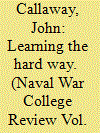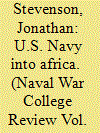| Srl | Item |
| 1 |
ID:
086795


|
|
|
|
|
| Publication |
2009.
|
| Summary/Abstract |
The United States faces multiple national security challenges, but in the longer sweep of history it is our response to the rise of Chinese power that may have the greatest significance. Over the previous two centuries the Anglo-American-led neoliberal order faced three rising powers. Great Britain managed the rise of American power at the end of the nineteenth century, through a deft strategy of accommodation and co-option. However, the United States and Britain failed to prevent the rise of Japanese and German power from leading to a calamitous global conflict. In those cases both deterrence and accommodation failed. We thus face the prospect of rising Chinese power with a one-for-three record, and the one case of success was one in which the rising power shared the values of the preeminent power.
|
|
|
|
|
|
|
|
|
|
|
|
|
|
|
|
| 2 |
ID:
086798


|
|
|
|
|
| Publication |
2009.
|
| Summary/Abstract |
The October 2007 initial deployment of the Africa Partnership Station (APS) to the Gulf of Guinea and the coincident rollout of A Cooperative Strategy for 21st Century Seapower signaled a strong American commitment to leveraging U.S. sea power to protect and sustain the global, interconnected maritime sphere. The APS is a Global Fleet Station (GFS) sea base designed to assist the Gulf of Guinea maritime community in developing better maritime governance for denying use of the sea to those who threaten regional and global security.
|
|
|
|
|
|
|
|
|
|
|
|
|
|
|
|
| 3 |
ID:
086803


|
|
|
|
|
| Publication |
2009.
|
| Summary/Abstract |
Since the attack on Khobar Towers in June 1996, the Department of Defense (DoD) has made significant improvements in protecting its service members, mainly in deterring, disrupting and mitigating terrorist attacks on installations. The attack on USS Cole (DDG 67), in the port of Aden, Yemen, on 12 October 2000, demonstrated a seam in the fabric of efforts to protect our forces, namely in-transit forces.
|
|
|
|
|
|
|
|
|
|
|
|
|
|
|
|
| 4 |
ID:
086797


|
|
|
|
|
| Publication |
2009.
|
| Summary/Abstract |
For the past decade, much has been debated and written about U.S. security interests in Africa. The George W. Bush administration has demonstrated a heightened awareness of Africa's importance to American geopolitical and economic interests as well as sensitivity to the continent's humanitarian challenges. The 2006 U.S. National Security Strategy identifies Africa as "a high priority" and "recognizes that our security depends upon partnering with Africans to strengthen fragile and failing states and bring ungoverned areas under the control of effective democracies."
|
|
|
|
|
|
|
|
|
|
|
|
|
|
|
|
| 5 |
ID:
086805


|
|
|
|
|
| Publication |
2009.
|
| Summary/Abstract |
Trying to predict the nature of future wars is nothing new. Given the stakes, it is not surprising that efforts to pierce the barrier of warfare's event horizon have long occupied security professionals. Accordingly, attempts to identify future enemies, theaters, tactics, and technologies have collectively represented an important component in strategic planning. Intelligence estimates, personality profiles of potential enemy leaders, and war plans of every hue and dimension provide tangible evidence of these efforts.
|
|
|
|
|
|
|
|
|
|
|
|
|
|
|
|
| 6 |
ID:
086800


|
|
|
|
|
| Publication |
2009.
|
| Summary/Abstract |
Although Africa has long been a low strategic priority for the United States, Washington now has a sharp and pronounced strategic interest in protecting access to rich reserves of sub-Saharan oil and gas, mainly in the vicinity of the Gulf of Guinea, as part of its drive to reduce dependence on Middle East suppliers. By 2010, Africa's share of U.S. oil imports could rise to 20 percent, and China has begun to engage the United States in a geopolitical contest for hydrocarbons and other economic and political benefits in sub-Saharan Africa.
|
|
|
|
|
|
|
|
|
|
|
|
|
|
|
|
| 7 |
ID:
086801


|
|
|
|
|
| Publication |
2009.
|
| Summary/Abstract |
The basic strategic problems confronting the U.S. Navy during the interwar years of the 1920s and 1930s were how to move a large fleet across the Pacific, absorb or avoid Japanese attritional attacks, seize forward bases for further operations, and retain sufficient fighting strength to defeat Japan's Combined Fleet. Japanese and American policies in Asia were in conflict, and war was a possible result; the U.S. Navy planned to win by destroying Japan's navy, imposing a blockade, and forcing Japan's surrender. Details of the strategic dilemma were the focus of interwar plans, large fleet maneuvers, and complex war games at the Naval War College, in Newport, Rhode Island. By the time war arrived in 1941, the concept of an advance across the Pacific had become the subject of extensive and detailed strategic planning.
|
|
|
|
|
|
|
|
|
|
|
|
|
|
|
|